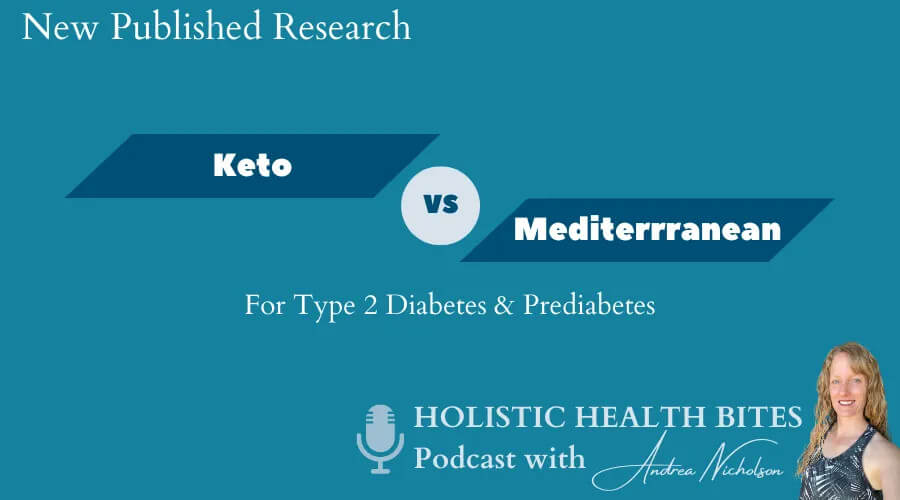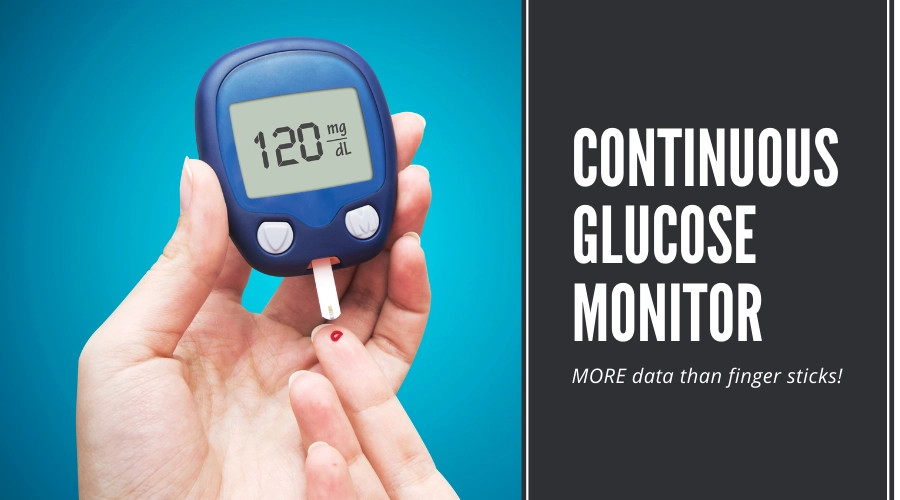
Keto versus Mediterranean for Diabetes
Today I’m sharing results from a research study looking at the differences and benefits between a well formulated ketogenic diet (very low carb at 12%-18% of intake) versus a moderate carb Mediterranean Plus diet (carb at roughly 36-37% of intake). This information comes from a study published in May 2022 in the American Journal of Clinical Nutrition.
*Side note – please do read the ENTIRE study. This paper got a LOT of criticism for writing very biased abstract and conclusions that didn’t exactly match up to the data of this study. 5 of the study authors are on the board of a Plant-Based Coalition committee.
The team conducted this study because there weren’t any studies comparing these two diets, but had only really compared low carb to low fat.
They studied a well formulated ketogenic diet versus a Mediterranean Plus diet: both incorporating non-starchy vegetables, restricting added sugars and limiting refined grains. The main differences between these 2 diets were including legumes, fruit, and whole grains on the Mediterranean Plus diet.
Study groups were followed for 12 weeks. Looking at hemoglobin A1c, fasting insulin, blood lipids, and continuous glucose monitor data.
Interestingly, they also tracked changes in the microbiome using stool testing, but didn’t include that data in this publication. They anticipate publishing that information separately. That will be fascinating information!
All participants had a diagnosis of prediabetes or diabetes (type 2).
Participants were randomly assigned to one of the two diets first for 12 weeks, then they swapped and did the other diet for 12 weeks.
The well formulated ketogenic diet instructions were to include 20-50g of carbohydrates, protein intake around 1.5g/kg of ideal body weight, and fill the remaining with fat. They were to exclude legumes, most fruits (allowed some berries), all grains and all sugars. They were advised to consume at least 3 servings of non-starchy vegetables daily and maintain adequate mineral and fluid intake.
The Mediterranean plus diet instructions followed the Mediterranean diet pyramid with the restriction of added sugars and refined grains. They were asked to follow a mostly plant based diet with vegetables (including starchy veg), legumes, fruits, whole grains, nuts, seeds, fish as the primary animal protein, olive oil as the primary fat.
All participants received weekly coaching and education. All meals and snacks were provided for the first 4 weeks of the diet by a dairy and gluten free food service company. The subsequent 8 weeks of each group involved participants making their own food – which could include dairy and wheat products (only on Mediterranean Plus).
Weight loss was not a primary metric of this study, so caloric restriction was not prescribed. Participants were told to eat until satiated throughout the study.
All participants were followed for an additional 12 weeks after both diet plans; and were told to choose whatever style of eating they wanted; not limited to these diets.
Any participants on sulfonylurea medications were asked to stop taking the medication during the keto diet phase and to reduce the dose by 50% during the Mediterranean phase. **This is pretty telling to me as to which diet is most impactful on blood sugars! Before they even began, they anticipated these medications to be unnecessary (and potentially dangerous) on keto!
When on the keto diet, participants measured blood ketones using a meter three times per week before breakfast. All participants were also tested via blood draw in a fasted state 7 times throughout the study.
Adherence to both diets were similar, with higher levels of adherence when the food was provided.
Results found during the study:
- A1c: dropped in both, ending almost identical between the two groups; though group that started with keto dropped the most.
- Fasting glucose: both dropped; best results were in the group that started with Mediterranean and ended with Keto.
- Fasting insulin: decreased for both groups after the first phase. Insulin continued to drop for the group that started with Mediterranean and ended with Keto. The group that started with Keto and ended with Mediterranean – had wild results with some continuing down and others dramatically increasing. Clearly there were varying levels of insulin sensitivity and glucose intolerance.
- LDL (“bad” cholesterol): went up during the Keto phase and down on Mediterranean phase for both groups; ultimately ended similarly to the baseline at the beginning.
- HDL (“good” cholesterol): improved after both phases in both groups. Initially dropped in the group that started with Mediterranean first. Improved dramatically during the Keto phase for this group.
- Triglycerides: improved in both groups; most significantly during Keto phase.
- ALT (liver enzyme): improved in both groups and phases.
- Weight: improved in both groups and phases. The group that started with Keto lost the most (and most of the weight loss occurred during the Keto phase).
- Average glucose (CGM data): improved in both groups, with the biggest decrease in group that started with Keto (10 mg/dL). Ultimately the group that started with Mediterranean dropped the most (13.4mg/dL)
My take on this information:
Both diets can be very beneficial. As can be any whole food diet! For anyone with metabolic disease of any kind – not just diabetes and prediabetes, managing blood sugar and insulin are vital to health.
Don’t be afraid of fat and protein – both are essential nutrients for life. There are no essential carbohydrates!
Scientists are still learning about the true effects of increased LDL, showing that this marker shouldn’t be used in isolation for cardiovascular risk. A deeper dive with particle size, apoB, and other markers being far more valuable – even showing protection from higher LDL in some cases.
Regardless of your current health status and health goals, limiting refined grains, added sugars, and prioritizing whole foods is advised. If you have any metabolic imbalances or diseases, you need to be more diligent with your food choices, likely decreasing your carbohydrate intake even more.
**If you are on any medications for blood sugar or blood pressure, please work with a professional before starting these types of diets. They’re VERY safe diets, but can become very dangerous on these medications – causing severe hypoglycemia or low blood pressure! Often medications need to be decreased or eliminated (safely with your prescribing physician) when taking on a nutritional approach. In my opinion, getting off medications is a great goal – don’t let this scare you. Just go about it safely!





















0 Comments